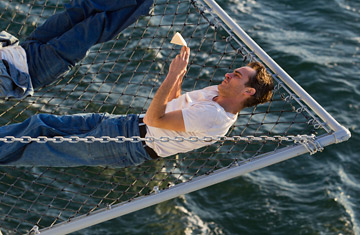
Joaquim Phoenix plays a troubled war veteran in The Master (2012).
(4 of 4)
River Phoenix, who earned an Oscar nomination at age 18 and died of a drug overdose five years later in 1993, is a secular saint of Generation X popular culture, a romantic icon of lost potential. His younger brother's I'm Still Here period raised the same specter of wasted promise, especially for those onlookers who weren't in on the joke. But to watch the film today, knowing that Phoenix is now doing the best work of his career, it's much easier to see I'm Still Here — indifferently received on its release — as a mordant, sometimes explosively funny riff on the Celebrity Entitlement Complex, anchored by a recklessly committed provocateur. Affleck, whom Phoenix met on the set of To Die For, has said the film is a work of performance art. Phoenix simply calls it a comedy.
"We thought, what if we could do the hardest-core version of Curb Your Enthusiasm?" Phoenix says. "Seinfeld, The Sarah Silverman Program, Curb Your Enthusiasm — everybody plays themselves. I mean, Ellen was called Ellen. But it's not them; it's a distorted version of them." Celebrity reality shows were also a touchstone, particularly Celebrity Rehab. "It's so obvious that it's manipulated and such total bulls---, and yet there's something so terribly exciting about that, so dangerous and ugly and scary and fantastic!"
Phoenix went to elaborate lengths to achieve the very thing that celebrities employ armies of agents, publicists and stylists to avoid: making himself look stupid. "Once I became a total buffoon, it was so liberating," he says. "Part of why I was frustrated with acting was because I took it so seriously. I want it to be so good that I get in my own way. It's like love: when you fall in love, you're not yourself anymore. You lose control of being natural and showing the beautiful parts of yourself, and all somebody recognizes is this" — Phoenix bugs out his eyes, lets his jaw go slack and reaches his hands out in supplication — "total desperation. And that's very unattractive."
Freddie Quell is not the work of an actor desperate to be loved. He's too catastrophically unsuited to a conventional redemptive arc. Freddie is a true misfit — not a cuddly Hollywood-movie misfit but someone we'd turn away from in real life, afraid that his off-ness might contaminate us. "Freddie has these brief moments when he sees himself as what he is, as others see him, and it's terrifying to him," Phoenix says. "He feels a real remorse for what he is."
Yet Phoenix does not refer to The Master as a tragedy or even a drama. "I thought it was a comedy. I laughed the entire time I was watching it," he says. "I think discomfort is funny — partly because I experience discomfort a lot, and it's a way of laughing at it and getting a release."
That discomfort is essential to Phoenix's uncompromising discipline, which is ferocious enough to sometimes appear as its opposite. Freddie can conform to no Cause, but Phoenix has recommitted to his. Making The Master, he says, "Paul called me Bubbles on the set. Bubbles was Michael Jackson's pet monkey, and I was Paul's pet monkey." And that was O.K. with you, Joaquin? "I didn't mind it at all. I love having a master."
